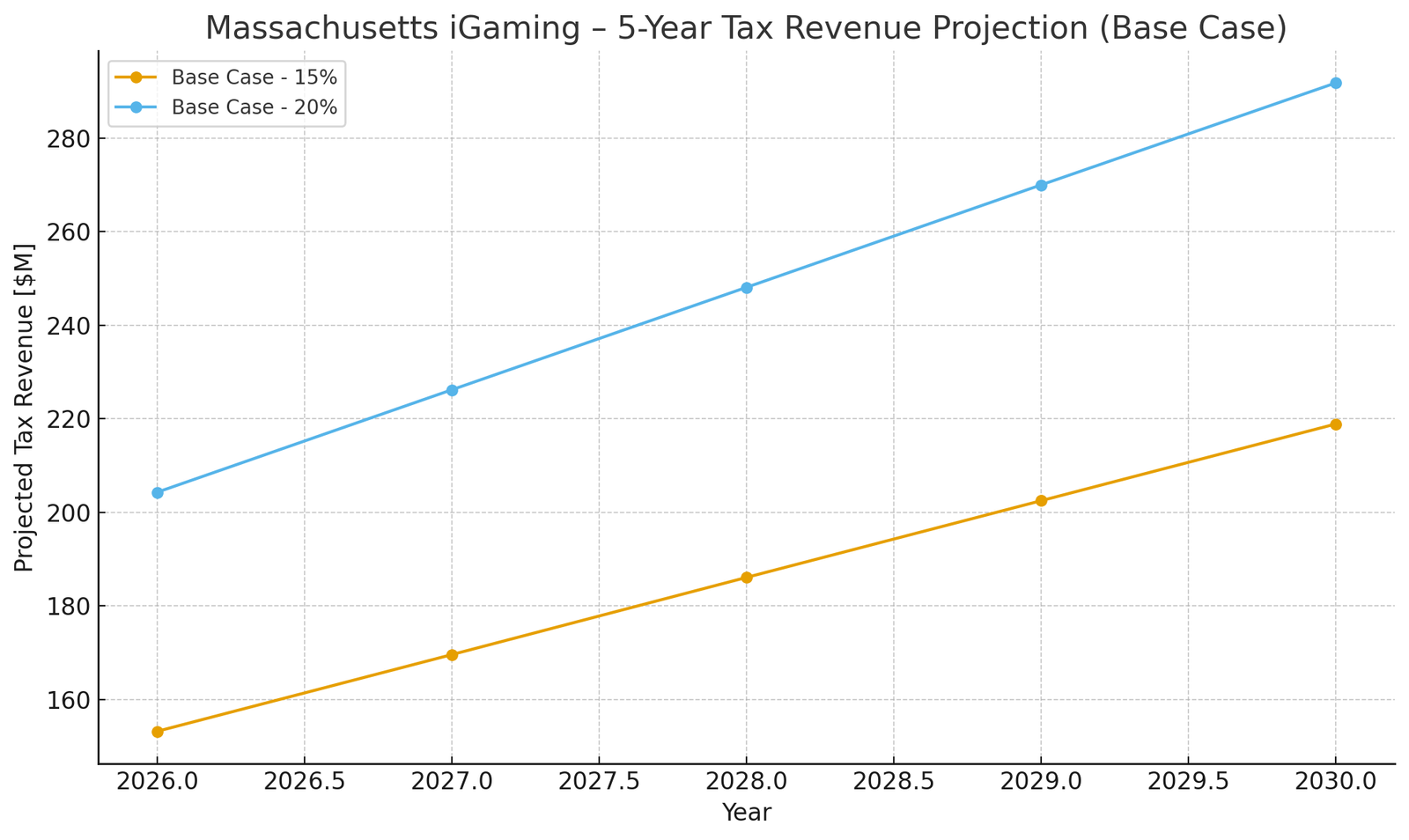
Monetization Models: Where Value Accrues
The Massachusetts iGaming Bill 2025 is expected to generate hundreds of millions of dollars in annual tax revenue, depending on the final tax rate and licensing framework. For comparison, New Jersey’s online gambling market produced $1.39 billion in revenue during the first half of 2025 (NJ Division of Gaming Enforcement, PlayNJ), while Pennsylvania’s online casinos generated $2.71 billion in 2024 (American Gaming Association).In Massachusetts, revenue would likely flow from licensing fees, taxation on operator revenues, and ongoing regulatory compliance. At the same time, lawmakers emphasize responsible gambling safeguards to balance economic growth with player protection. This dual approach mirrors best practices in mature North American and European iGaming markets.
Market Comparison: NJ vs PA vs MA (Proposed)
| State | Status | Main Tax Rate | Licensing / Notes | iGaming Revenue |
|---|---|---|---|---|
| New Jersey | Legal | 19.75% (effective FY26) + 2.5% IAT | Multiple skins allowed | $1.39B (H1 2025 YTD) |
| Pennsylvania | Legal | 54% on online slots; 16% on tables/poker | Category-based licenses | $2.71B (2024) |
| Massachusetts | Proposed | 15–20% (depending on bill version) | Up to 3 skins per license; ban on sweepstakes | No official revenues yet |

Source: NJ Division of Gaming Enforcement, American Gaming Association, CasinoVVV modeling.
For further analysis on Massachusetts iGaming tax scenarios, read our in-depth coverage: Massachusetts iGaming Legalization & Tax Increase 2025.
5-Year Revenue Projections for Massachusetts
Based on per-capita benchmarks from New Jersey (~$299 per capita annually) and Pennsylvania (~$208 per capita annually), Massachusetts could generate:
- At 15% tax: ~$150M in Year 1, growing to ~$220M by Year 5.
- At 20% tax: ~$200M in Year 1, growing to ~$290M by Year 5.
These projections assume gradual market adoption, three licensed operators with up to three skins each, and continued focus on responsible gambling safeguards.
Note: New Jersey and Pennsylvania figures are officially reported. Massachusetts numbers are modeled projections based on comparable state benchmarks. Final results will depend on the enacted legislation, tax structure, and operator adoption.
Regulatory Contours Shaping Massachusetts iGaming Bill 2025: Is Online Casino Finally Legal in the State?
Massachusetts is among the top contenders in the U.S. exploring expanded online gambling legislation. The Massachusetts iGaming Bill 2025 embodies a strategic legislative framework that aims to regulate the burgeoning online casino sector. Importantly, this bill seeks to address concerns about gambling addiction, data privacy, and fair play. The proposed regulations are designed to ensure that operators comply with stringent licensing requirements, ensuring a fair and transparent gaming environment. For context, this legislative approach mirrors successful models in regions like the UK and parts of Europe, where regulation harmonizes player protection with industry growth.
This bill highlights the delicate balance between strong player demand and the cautious hand of state regulation. Massachusetts lawmakers are aware that residents are already engaging with offshore platforms, often without the protections of a regulated market. By creating a legal pathway, the state acknowledges this demand while seeking to reclaim oversight and tax revenue.
At the same time, regulators face pressure to avoid a “race to the bottom” in pursuit of fast revenue. Unlike sports betting, which Massachusetts legalized in 2023 with a relatively straightforward model, online casinos touch on deeper issues: the intensity of play, potential for addiction, and direct competition with land-based venues. The bill’s emphasis on responsible gambling, licensing integrity, and data safeguards shows that policymakers are keen to learn from both U.S. neighbors (New Jersey, Pennsylvania, Michigan) and international leaders such as the UK.
In that sense, the Massachusetts iGaming Bill 2025 could mark a turning point for U.S. iGaming. If successful, it may establish a “gold standard” regulatory blueprint that other hesitant states—like New York, Illinois, or even California—could adopt or adapt. Conversely, if poorly implemented, it risks reinforcing skepticism about online casinos nationwide.
UX and Journey Patterns Around Massachusetts iGaming Bill 2025: Is Online Casino Finally Legal in the State?
As the Massachusetts iGaming Bill 2025 progresses, user experience (UX) and player journey become pivotal focus areas. The legislation hints at a digital landscape where ease of access and user-centric design take precedence. Players can expect streamlined registration processes, intuitive interfaces, and enhanced mobile compatibility. Moreover, the bill underscores the importance of secure transactions and robust customer support systems, ensuring that the player journey is both seamless and secure. This attention to UX is not merely an operational detail but a strategic imperative that could define the competitive edge for operators entering the Massachusetts market.
In conclusion, Massachusetts stands on the brink of a transformative era in online gaming. The iGaming Bill 2025 embodies both opportunity and caution, promising economic benefits while safeguarding player interests. Track practical shifts in Massachusetts iGaming Bill 2025 — read CasinoVVV’s global analysis.
What is the Massachusetts iGaming Bill 2025?
The Massachusetts iGaming Bill 2025 is proposed legislation aimed at legalizing online casinos and other forms of internet gambling in the state.
Is online casino gaming currently legal in Massachusetts?
As of now, online casino gaming is not yet legal in Massachusetts, but the 2025 bill seeks to change that status.
How would the iGaming Bill 2025 impact players in Massachusetts?
If passed, the bill would allow residents to legally participate in online casino games through licensed platforms.
What types of games are included in the Massachusetts iGaming Bill 2025?
The bill proposes the legalization of various online casino games, including slots, table games, and poker, accessed through regulated sites.
Who will regulate the online casinos if the bill is passed?
The Massachusetts Gaming Commission is expected to oversee the licensing and regulation of online casinos under the new legislation.
What are the potential challenges of implementing the Massachusetts iGaming Bill 2025?
The bill may face challenges such as establishing regulatory frameworks, ensuring player protection, and addressing concerns from brick-and-mortar casino stakeholders.
This article was written and edited by the CasinoVVV.com editorial team, delivering accurate insights and trusted perspectives on the casino world.
Read also: Ontario Online Casino License 2025 Full Guide • New York Casino Race 2025: Community Boards Back MGM And Resorts World
